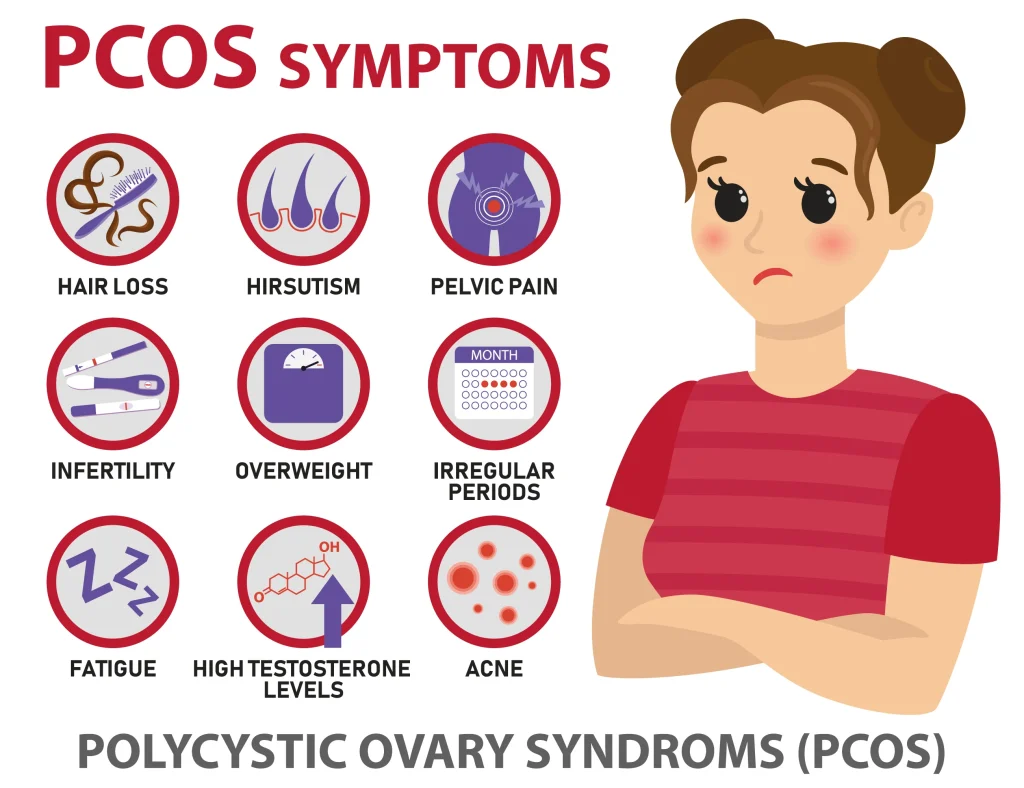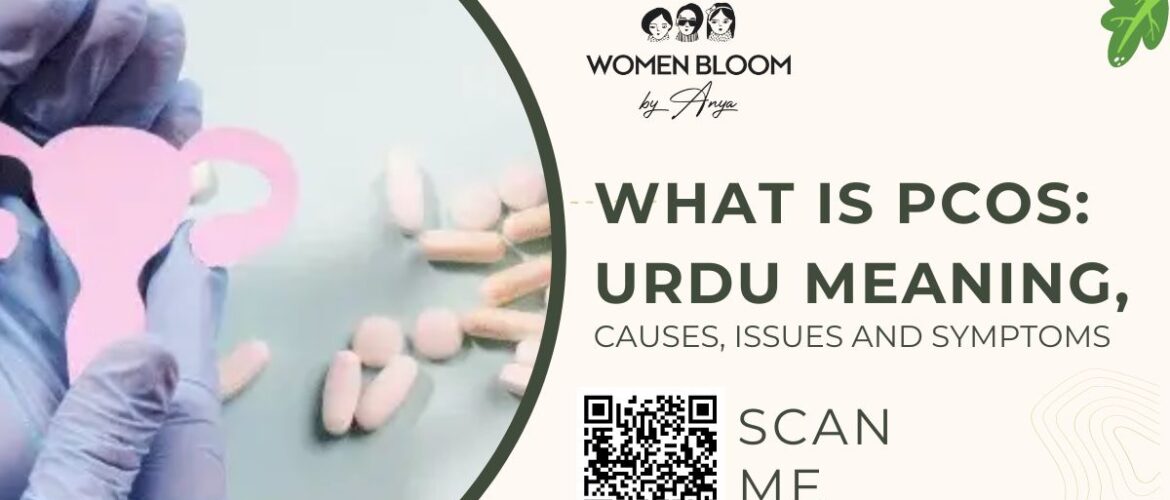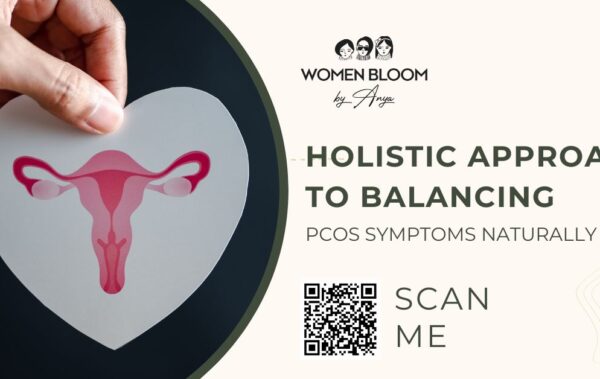PCOS in urdu known as پولی سسٹک اووری سنڈروم . The hormonal disease known as Polycystic Ovary Syndrome (PCOS) affects females who are of reproductive age, meaning they are between adolescence and menopause. Ovarian cysts, irregular menstruation, and elevated levels of male hormones are the hallmarks of PCOS, a complicated disorder.
Multiple cysts are the direct translation of PCOS. It is a heterogeneous condition, meaning hereditary and environmental factors may be involved. In addition, the sickness is linked to a higher risk of endometrial cancer, heart problems, and type-2 diabetes.
Dysregulated hormones cause PCOS by changing ovulation, causing irregular menstruation and eventually impairing female fertility.
Everybody has distinct symptoms of PCOS. Still, the following are some typical signs of PCOS:
What is PCOS in Urdu:
پی سی او ایس، جسے (پولی سسٹک اووری سنڈروم) کہا جاتا ہے، خواتین میں ایک عام ہارمونل بیماری ہے۔ یہ بیماری انڈے دانیوں میں چھوٹے چھوٹے سسٹ پیدا ہونے کی وجہ سے ہوتی ہے، جو ہارمونز کی بے توازن کا سبب بنتے ہیں۔ پی سی او ایس کی علامات میں ماہواری کی بے قاعدگی، وزن کا بڑھنا، چہرے پر زائد بالوں کا آنا اور بانجھ پن شامل ہیں۔ اس بیماری کا علاج مناسب غذا، ورزش اور دواؤں سے ممکن ہے، جس سے خواتین صحت مند اور خوشحال زندگی گزار سکتی ہیں۔
PCOS, known as Polycystic Ovary Syndrome (پولی سسٹک اووری سنڈروم), is a common hormonal disorder in women. It occurs due to the formation of small cysts in the ovaries, leading to hormonal imbalances. Symptoms of PCOS include irregular menstrual cycles, weight gain, excessive facial hair, and infertility. Treatment involves a proper diet, exercise, and medication, helping women lead a healthy and fulfilling
Symptoms of PCOS:

- Disturbed menstrual cycle(irregular or no periods)
- severe acne
- Overgrowth of face or body hair (a fancy term for hirsutism)
- Gaining weight
- Insulin resistance, or the body’s inability to react to insulin, frequently causes elevated blood sugar levels and may eventually result in diabetes.
- excessively high blood levels of insulin (also known as hyperinsulinemia, to be precise)
Causes and Risk factors of PCOS:
The fact that the precise origin of PCOS is still unknown accounts for the abundance of unanswered questions surrounding the condition.
Although many hypotheses have been put out, most of them have turned out to be erratic and contentious, leaving us needing a conclusive solution. Different interplay between genetic and environmental variables are thought to be the cause.
Hormones and PCOS symptoms are related:
- The slightly elevated testosterone levels in PCOS-affected women are associated with several symptoms, including increased facial hair.
- Your body may not respond to insulin if you have PCOS; this condition is known as insulin resistance, and it results in a higher blood glucose level. Problems with fertility and weight gain might result from high insulin levels. If you have PCOS, you have a higher chance of getting diabetes later in life.
- The majority of specialists concur that PCOS is a hereditary ailment; nevertheless, certain environmental and behavioral variables, including stress, drugs, nutrition, and other lifestyle factors, increase the likelihood of the genetic problem manifesting
How is a diagnosis of PCOS made?
Healthcare professionals (HCPs) can diagnose PCOS based on symptoms, by using blood tests, a pelvic exam, or a transvaginal ultrasound to check for abnormalities.
When a person exhibits at least two of the following three indicators, PCOS may be diagnosed:
- Physical examination
- Irregular periods and family history
- Ultrasounds to see ovaries with larger and more numerous cysts
An HCP can utilize blood test clues to diagnose PCOS in a patient by check the following things:
- Elevated amounts of testosterone in the blood
- Indicators of metabolic problems, such as elevated fasting cholesterol, triglyceride, or blood glucose levels and excessive insulin in the blood
How to treat PCOS:
PCOS does not presently have a treatment. Symptom management is aided by medications, lifestyle modifications, and other therapy.
Treatment plans are individualized based on your requirements and symptoms
Changes in lifestyle
The primary line of treatment for PCOS is changing one’s lifestyle; even modest adjustments have been shown to improve metabolic dysfunction and ovulation. Losing weight in overweight or obese PCOS women can lower testosterone levels, encourage regular menstruation, and potentially increase the chances of conceiving early.
Adding physical activities like exercise will help to lower the risk of getting cardiovascular disorders.
PCOS medicines
Your doctor may discuss several drugs that are used to treat the symptoms of PCOS.
- Hormonal contraception: Hyperandrogenism is treated with hormonal contraception, which includes birth control tablets, injections, and patches.
- Fertility pills: Medication for infertility is the use of pharmaceuticals to induce ovulation in the hopes of becoming pregnant. The most often used therapy for infertility is clomiphene citrate.
- Anti diabetic drugs: Metformin is an anti-diabetic drug that increases ovulation rate and decreases testosterone levels.
Typically, anti-androgen drugs are used to treat male pattern baldness and stop excessive hair growth.
How to manage PCOS naturally:
It is possible to control PCOS naturally by some scenarios. Though each method might take some time, the 100% success rate makes the effort worthwhile. All you need is the right management techniques to avoid any negative side effects.
Because every woman’s body is different from the other one.That’s why you need some things that actually work and make you live a happy life.
Using her own experience as a guide, Anya, the founder of “Women Bloom,” undertook a comprehensive analysis and discovered natural supplements that promote the control of PCOS and the restoration of hormone balance.
This online superfood store offers a wide variety of foreign seeds, herbal teas, and other non-toxic natural remedies to help manage the symptoms of PCOS and balance your hormones.
All products are put through rigorous quality inspections in order to provide the best possible health effects for customers.
For PCOS you should try our Seed cycling kit. The hormonal imbalance problems in the body are the specific focus of this seed cycling mix kit. Therefore, the other issues, such as mood swings, irregular periods, hypothyroidism, and infertility, will instantly get better.
You can also utilize the Herbal teas to manage your PCOS symptoms. The products contain the right amount of each herb and some roasted ones.
Additionally, these organic teas, which are imported from the UK, help with endometriosis, hair loss, hormone imbalances, premenopause, poor flow, insulin resistance, PMS, and decreased libido.
In summary
Receiving a PCOS diagnosis can be quite upsetting. Do not, however, give up. PCOS is under your control. To continue working through your PCOS journey, choose a physician that you trust and feel comfortable dealing with, such as an OB-GYN, reproductive endocrinologist, or general practitioner.
Receiving a diagnosis as soon as possible can lower your long-term risks. Following your diagnosis, concentrate on collaborating closely with your physician and the PCOS care team to ensure that you reach your objectives and live a healthier PCOS-affected life.






